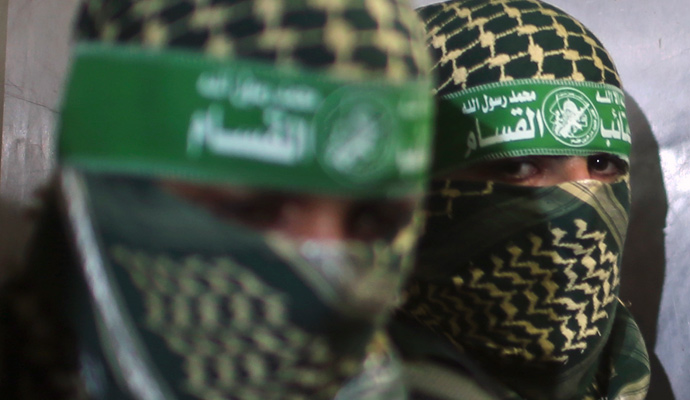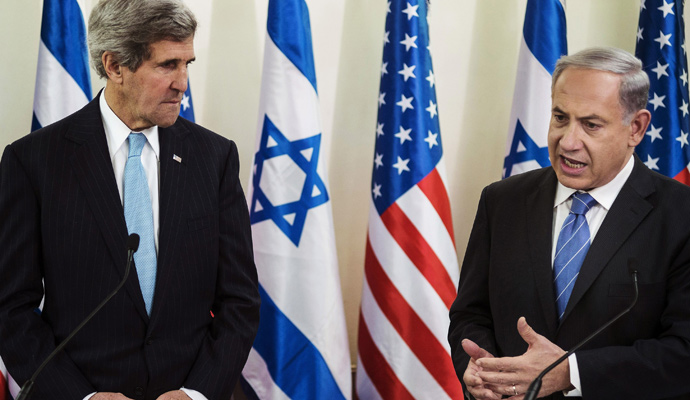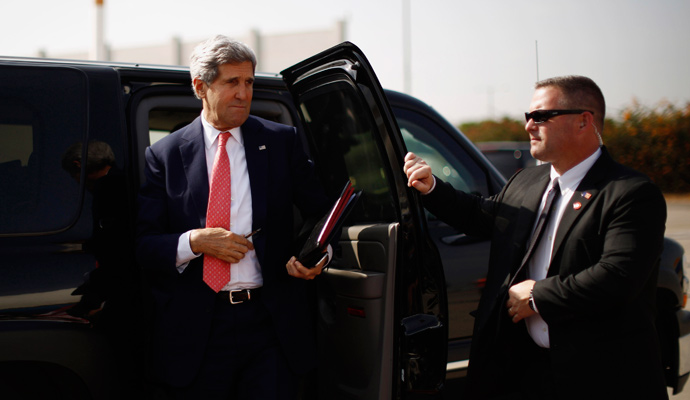Why Israel can't kill Hamas
Experts and insiders say that Israel's military offensive will only further radicalize the Palestinian population — and alienate frustrated friends in the United States

A free daily email with the biggest news stories of the day – and the best features from TheWeek.com
You are now subscribed
Your newsletter sign-up was successful

Hamas, the conventional wisdom goes, is in deep trouble.
The movement, one respected Israeli analyst claims, is "shunned and isolated" in the Arab world, facing a nascent revolt among its Gaza constituents, and "looking for a way out" of its current conflict with Israel, which is now entering its second week and has already cost more than 160 Palestinians their lives. Hamas's weakness, according to the head of a major Washington think tank, actually spurred the conflict: "Hamas started conflict because of isolation/weakness; will end conflict weaker/more isolated," he recently tweeted.
It's not hard to see why Hamas is thought to be on the ropes. In the wake of the June 12 kidnapping and murder of three Jewish teenagers, the Israel Defense Forces (IDF) cracked down hard on the Palestinian Islamist movement in the West Bank, arresting more than 300 of its operatives and scooping up its arms caches in the territory. The IDF has now turned its attention to Gaza, launching Operation Protective Edge and striking more than 1,300 sites — at the cost of over 160 Palestinian lives. Even before the current outbreak in violence, Hamas's political position looked weakened. The removal of former Egyptian President Mohamed Morsi in a coup last summer cost Hamas an important international patron, and the new military regime in Cairo has aggressively attempted to close the tunnels connecting the Sinai Peninsula to the Gaza Strip, which are Hamas's lifeline to the outside world. Even the creation of a new unity government with Palestinian Authority President Mahmoud Abbas's Fatah party seemed to signal a sidelining of the Islamist group in favor of traditional PLO leadership.
The Week
Escape your echo chamber. Get the facts behind the news, plus analysis from multiple perspectives.

Sign up for The Week's Free Newsletters
From our morning news briefing to a weekly Good News Newsletter, get the best of The Week delivered directly to your inbox.
From our morning news briefing to a weekly Good News Newsletter, get the best of The Week delivered directly to your inbox.
Is Hamas isolated? Is it weakened? In fact, according to a number of U.S. military and intelligence analysts, the truth is just the opposite.
Hamas is strong — and Israel's current attack on it will likely make it stronger.
"The IDF claims it's broken the back of Hamas in [the West Bank cities of] Hebron, Bethlehem, and Nablus," a senior Fatah official told me this week. "That's a joke. The real threats are already in jail. These guys were the usual suspects."
(More from Foreign Policy: Resetting America's military)
A free daily email with the biggest news stories of the day – and the best features from TheWeek.com
This is also true for Gaza. Nor is Hamas desperate to negotiate a cease-fire with the Israelis. On July 9, a senior Arab diplomat in Amman, Jordan, passed on a report from one of his Egyptian colleagues: Egyptian President Abdel Fattah al-Sisi had been in touch with the Hamas leadership, he said, offering to mediate the conflict.
"Hamas turned him down," this diplomat reported. "They said, 'If Israel wants to come, let them come.'"
Osama Hamdan, the head of Hamas's foreign relations bureau, whom I reached by telephone the same day, would not confirm the report. But when I asked him to give his assessment of the pressures his movement was under, he hesitated for only a moment.
"We're fine," he said.

* * *
This isn't the first time that Israeli and American observers have predicted Hamas's demise. In fact, they have been doing so since 2006 — only to be disappointed each time.
When the Palestinians held legislative elections in January 2006, then Secretary of State Condoleezza Rice was supremely confident of a Fatah victory. With the United States supplying Fatah with campaign expertise and funding, she believed, Hamas would lose the elections and be discredited. But Hamas won — in a landslide.
Israel then cut off Gaza from basic foodstuffs and commercial goods. As one Israeli official put it, the idea was to "put the Palestinians on a diet," creating an economic crisis so severe that Hamas would lose its popular standing. It didn't happen. So, in 2007, the United States decided to support the creation of a Fatah militia to crush Hamas in Gaza. Instead, Hamas preempted the operation — in vicious but short-lived fighting, it was Fatah that was removed from Gaza, not Hamas.
A series of Israeli military operations since then has similarly failed to destroy Hamas. Operation Cast Lead, launched in December 2008, resulted in 1,400 Palestinian deaths, as well as the deaths of three Israeli civilians and six IDF soldiers, over the three-week operation. Operation Pillar of Defense, in November 2012, aimed to "cripple terror organizations in the Gaza Strip and defend Israelis living under fire," according to the IDF. At the end of each operation, Israel extolled its military successes — providing lists of Hamas leaders it had killed, plus weapons depots, rocket stores, launchpads, and suspected Hamas command posts it had destroyed. But at the end of each operation, Hamas remained in control of Gaza and capable of launching rockets at Israel.
Some U.S. military officials have grown exasperated with the perpetual claims that Hamas is on the verge of being destroyed.
"It's nearly impossible to quantify Hamas's capabilities or its ability to survive the current attacks," said a senior U.S. military officer who monitors the Israeli-Palestinian conflict. "But I would say that given its history, the 'Hamas is finished' scenario is an exaggeration.... The movement has shown that it's capable of taking a punch."
* * *
Israel has not only failed to eliminate Hamas, but its approach to the Palestinians has antagonized its most important ally, the United States. Following the collapse of Secretary of State John Kerry's attempt to negotiate a resolution of the Israeli-Palestinian conflict, U.S. officials have shown signs of both conflict fatigue and frustration with the Israeli government.
Even as air-raid sirens sounded throughout Israel last week, Philip Gordon, the White House's coordinator for the Middle East, sharply questioned, at a Tel Aviv conference, the course taken by Prime Minister Benjamin Netanyahu's government.
(More from Foreign Policy: And the winner is... Schland)
"How will Israel remain democratic and Jewish if it attempts to govern the millions of Palestinian Arabs who live in the West Bank?" Gordon asked. "How will it have peace if it's unwilling to delineate a border, end the occupation, and allow for Palestinian sovereignty, security, and dignity? How will we prevent other states from supporting Palestinian efforts in international bodies, if Israel is not seen as committed to peace?" Gordon added that Israel's occupation of the West Bank dehumanizes Palestinians and leads to "regional instability" — a reference to Washington's claims that the continuing Israeli-Palestinian conflict hinders U.S. ties with its regional allies.
Gordon wasn't saying anything that Kerry hadn't said privately to Netanyahu during the nine-month-long peace negotiations. Some of those exchanges, said a senior U.S. diplomat familiar with the talks, "had been uncomfortably blunt."
The most uncomfortable exchange between Kerry and Netanyahu, this diplomat said, took place in early February, after Kerry arrived in Jerusalem from a meeting with European officials at the Munich Security Conference. This diplomat said that Kerry had expected that the Munich meeting would focus on Eastern Europe and the Ukraine crisis. Instead, European officials harangued Kerry about his Israeli-Palestinian mediation efforts. If Israel didn't get serious about the peace process, Kerry was told, the European Union was willing to support efforts to delegitimize and boycott it. When Kerry responded that the United States would oppose such efforts, he was rebuffed: Europe, he was told, had run out of patience.

According to this same senior diplomat, when the secretary of state arrived in Jerusalem on Feb. 2, he carried a harsh message for Netanyahu. In a private meeting, an impatient Kerry told Netanyahu that "Israel is in trouble in Europe" and that the Europeans had "stopped listening" to American advice. Netanyahu thought he was being lectured, and he responded angrily. "Israel will not be blackmailed into signing an agreement with the Palestinians" that would endanger its security, he said. "He actually wagged his finger at the secretary of state," the senior diplomat told me. "Can you imagine? He wagged his finger at him."
Kerry was exasperated, but no more so than when the details of his meeting were leaked to the Israeli media. Within hours, Israeli Economy Minister Naftali Bennett accused Kerry of serving as a "mouthpiece" for anti-Semitic forces.
Kerry's advisors were convinced that Netanyahu, who feared a collapse of his government, was responsible for the leak and had approved Bennett's statement. Confronting Kerry was a standard strategy for Netanyahu, as it appeased the Israeli right — but being called an anti-Semite was a bridge too far.
"A mouthpiece for anti-Semites? Just incredible. Really, there's only so much you can take," the U.S. diplomat told me at the time.
But while navigating the shoals of Israeli politics was hazardous enough, Kerry also had to contend with the Palestinian leadership. Abbas and his aides, a senior Fatah official said, had deep disagreements over their negotiating strategy. Abbas was being too accommodating to Israel, a number of them argued — which was strengthening Hamas in the West Bank and Gaza. The more Abbas negotiated, the weaker he looked.
The deep tensions at the very top of the Ramallah leadership were most obvious during a meeting Kerry held with lead Palestinian negotiator Saeb Erekat and Abbas several months prior to his February meeting with Netanyahu. During the meeting, as Kerry looked on in discomfort, Abbas turned on the sometimes long-winded Erekat.
"Just shut up," Abbas shouted at him. "Can't you shut up? All you do is talk. Just shut up."
Abbas then turned to Kerry. "Don't listen to him," he said. "You're negotiating with me."
By early March, Abbas was facing off against several of his more outspoken senior Fatah leaders, according to one well-placed Fatah official. In one session in Abbas's office in Ramallah this year, Abbas turned on one of his critics, accusing him of being pro-Hamas. "How can you defend these people?" he shouted. "They are the ones who have embraced Iran. How do you think that looks?"
His critic wheeled on him, said the Fatah official. "That's right. And we're the ones who have embraced Israel. How do you think that looks?" Abbas's critic stormed from the room, shouting at the Palestinian president over his shoulder. "And we've gotten nothing. Nothing."
* * *
While Kerry was negotiating with Abbas, the "unseen presence in the room," according to this same senior Fatah official, was Hamas.
Hamas had been sidelined during the negotiations, but Abbas had warned Kerry that he would reconcile with the group should the peace process fail and also request to join international organizations in order to boost recognition of the Palestinian state. The Palestinian president made good on that promise after the collapse of the talks, signing an agreement on a unity government with the Islamist movement in April.
According to the Fatah official, Abbas reassured Kerry that the reconciliation agreement was designed to "destroy Hamas" by bringing it into the political process and then defeating it in subsequent elections. "I hate Hamas," Abbas told Kerry, according to this Fatah official. "But don't worry — I have a plan for them. You'll see."
Netanyahu aides were quick to dismiss Abbas's strategy for Hamas. They "absolutely howled with laughter," the senior U.S. diplomat who spoke to me about the February Netanyahu-Kerry meeting said.
"It was just incredible," this U.S. diplomat told me in March. "They gave [Kerry] the 'wolf in sheep's clothing' routine, saying that Abbas's strategy showed that there was no difference between him and the terrorists. They even claimed that Abbas's real strategy was to turn over the PA [Palestinian Authority] to Khaled Meshaal [the head of Hamas's political bureau]."
Kerry, this diplomat went on to say, could hardly believe what he was hearing. If Israel was convinced that Abbas was a stalking horse for Hamas, why did they engage in the peace process to begin with? "This was just crazy," the senior U.S. diplomat said. "The secretary was stunned."

Following the peace process's collapse and the Palestinian unity agreement, Israeli officials stepped up their rhetoric against Hamas. Israeli Intelligence Minister Yuval Steinitz told a group of Washington reporters in late June that the group was virtually indistinguishable from the region's most violent jihadists, such as the Islamic State (formerly known as ISIS). "I don't see much difference between these Hamas terrorists and the people from ISIS who executed the Iraqi soldiers," he said.
(More from Foreign Policy: Responsibility to protect the bad guys)
The implication of the Steinitz claim was that, like the United States in Iraq, Israel wanted to portray itself as fighting violent jihadists, "who are all the same and want the same thing," a retired U.S. intelligence veteran explained. "That's just nonsense. ISIS is far, far more radical than Hamas. As soon as Hamas agreed to participate in elections, they were branded as apostates [by more radical groups]."
"This idea that attacking Hamas can strengthen Palestinian moderates is just silly," this same intelligence officer told me. "The truth is that [Operation] Protective Edge has weakened Abbas and left a void in the West Bank. And guess who's going to step in? Israel doesn't seem to have an answer to the 'what next' question."
* * *
The "what next question" is a worry for an increasing number of U.S. diplomats and intelligence officers. Successive Israeli attacks on Gaza over the last years have splintered Gaza's militant groups — strengthening some, such as certain elements in the Popular Resistance Committees and Islamic Jihad, that are far more radical than Hamas. In 2007, again in 2009, and then just last May, the Hizb ut-Tahrir movement, which calls for the establishment of a caliphate to "liberate the Holy Land," held rallies in Hebron and Ramallah that attracted a small but dedicated band of followers.
"In the American media, it's 'Hamas, Hamas, Hamas,'" Yousef Munayyer, the executive director of the Jerusalem Fund, said. "It's a great talking point, but this shouldn't be about talking points. Israel's actions are radicalizing Palestinian society. Maybe that's what they want, but I can't imagine that's what we want."
While Israeli officials might lump Hamas in with ISIS, the group itself has been increasingly worried about the emergence of more radical Islamist movements. This could be clearly seen in the immediate aftermath of the June 12 kidnapping and murder of the three Israeli teens, which took Hamas's leadership by surprise. "They were caught flat-footed," the senior Fatah official with whom I spoke confirmed. "They didn't order the kidnapping or the murder and were surprised it happened. We ourselves thought it wasn't aimed at Israel, but at breaking up the unity agreement."
Hamdan, the head of Hamas's foreign relations bureau, refused to comment on this speculation, but denied that Hamas was behind the incident. "To this moment we don't know" who the perpetrators are, he told me in the immediate aftermath of the kidnapping. He provided the same answer when I gave him the names of the prime suspects, members of the Qawasmeh family of Hebron. "We don't know," he repeated.
With Operation Protective Edge entering its eighth day, the United States is now scrambling to again find a way out of the conflict. But unlike previous confrontations, getting both sides to agree on a cease-fire will be much more difficult. "Abbas is weakened; Israel has a government that needs to show how tough it is; and Hamas is looking at its competitors in Gaza," said Nathan J. Brown, a professor of political science and international affairs at George Washington University. "There aren't too many exit points. The current crisis could go on for quite some time and be very bloody."
So far, Israel's eight-year attempt to batter Hamas into submission has not only met with failure, but its successive military onslaughts might just have succeeded in creating an increasingly radicalized Palestinian population and alienating Israel's most powerful ally.
"Why would you adopt policies that actually create more Islamists?" asks a former U.S. intelligence analyst who spent his career monitoring the Israeli-Palestinian conflict. "And why would you offend a secretary of state and a country that's one of your last friends in the world? The unalterable and, for many, unutterable truth of this conflict is that Israel should stop looking out and start looking in. It's time for them to admit that their strategy of isolating Hamas, weakening Fatah, and offending America hasn't worked and won't work. Maybe it's time to try something else."